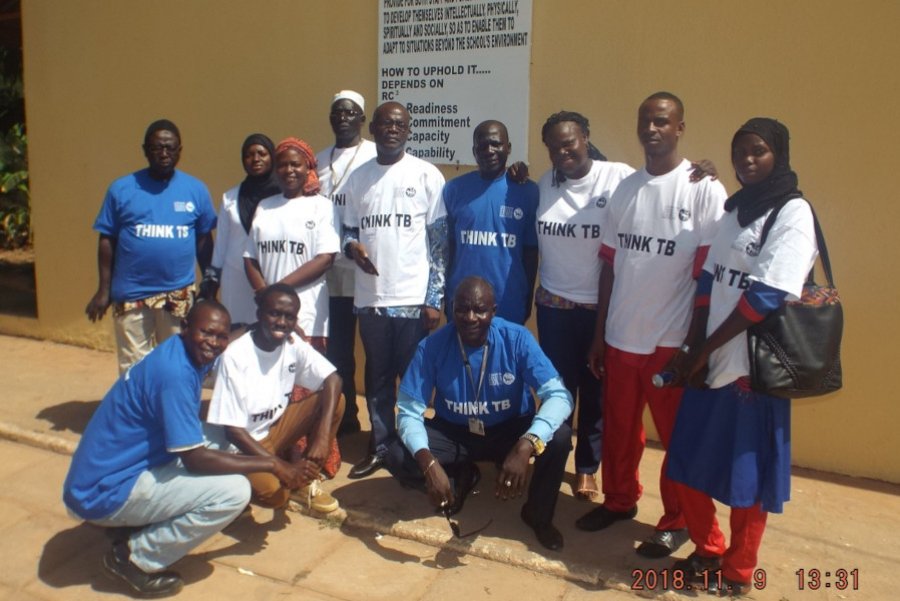
Understanding the pathways of tuberculosis (TB) patients to diagnosis and treatment is an important component of the overall strategy toward improving quality of TB care, as highlighted in a new paper published in the International Journal of Infectious Diseases by TB researchers at the Medical Research Council Unit The Gambia at the London School of Hygiene & Tropical Medicine (MRCG at LSHTM).
The provision of high quality of care for TB patients, with an emphasis on rapid and accurate diagnosis and on patient-centred outcomes, is one of the cardinal objectives of the End TB Strategy of the World Health Organization (WHO). The current public health strategy for the control of TB in The Gambia, and in other TB-endemic low- and middle-income countries (LMIC), is geared towards early detection of infectious TB patients, mostly through passive case detection, followed by prompt initiation of treatment. However, this approach is characterised by TB diagnostic delay, which is one of the surrogates for quality of TB care.
In a study conducted in the Greater Banjul Area (GBA) of The Gambia, researchers at the MRCG at LSHTM investigated the prevalence of TB diagnostic delay and its associated risk factors, as well as TB care-seeking pattern, among newly diagnosed adult pulmonary TB patients. The researchers found that at least half of all newly diagnosed adult TB patients in the GBA initiated TB care-seeking in the formal or informal private sector, and that approximately 84% had TB diagnostic delay as defined by the WHO i.e. more than 21 days from onset of symptoms suggestive of TB to diagnosis. Also, age younger than 50 years and being employed were strong and independent risk factors for TB diagnostic delay.
Dr. Olumuyiwa Owolabi, first author of the publication and lead clinician on the MRCG at LSHTM’s TB Case-Contact (TBCC) research platform said, “Our study found that there is considerable delay in the diagnosis of TB in The Gambia, whereby adult patients with infectious TB disease made an average of three visits to health care facilities before diagnosis. The insight from this research has highlighted the need for larger prospective studies and standard cascade-of-care analysis to better understand patients’ pathways to care, including the influence of demographic and socio-economic factors in care-seeking behaviour of TB patients. There is also the need to investigate and understand the best modalities for engaging the private sector in the national TB control efforts in The Gambia.”
Dr. Toyin Togun, Assistant Professor at the LSHTM and senior author on the publication said, “Published studies reporting on patient-centred quality of TB care, or surrogates of quality of TB care such as TB diagnostic delay in the period prior to the COVID-19 pandemic, are severely lacking in West Africa, compared to the other regions in Africa. The findings in this initial exploratory and pragmatic study are appropriate for the public health context of The Gambia, give a rare insight into the quality of TB care in West Africa, and importantly provide a unique benchmark against which we can measure efforts to better understand and improve the overall quality of TB care in the era of the COVID-19 pandemic. I would like to thank our main collaborators, the Gambian National Leprosy and TB Control Programme (NLTBCP), and to particularly acknowledge the contributions of Professor Beate Kampmann - Theme Leader for the Vaccines & Immunity Theme, Dr Jayne Sutherland - Head of TB Research Group, and the TBCC clinic and field teams in enabling this research.”
This research was supported by the UK Medical Research Council and the UK Department for International Development (DFID, London, UK) under the MRC/DFID Concordant agreement.
Our postgraduate taught courses provide health practitioners, clinicians, policy-makers, scientists and recent graduates with a world-class qualification in public and global health.
If you are coming to LSHTM to study a distance learning programme (PG Cert, PG Dip, MSc or individual modules) starting in 2024, you may be eligible for a 5% discount on your tuition fees.
These fee reduction schemes are available for a limited time only.
